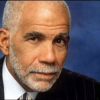Ed Bradley

Ed Bradley
Edward Rudolph "Ed" Bradley, Jr.was an American journalist, best known for 26 years of award-winning work on the CBS News television program 60 Minutes. During his earlier career he also covered the fall of Saigon, was the first black television correspondent to cover the White House, and anchored his own news broadcast, CBS Sunday Night News with Ed Bradley. He received several awards for his work including the Peabody, the National Association of Black Journalists Lifetime Achievement Award, and 19...
NationalityAmerican
ProfessionJournalist
Date of Birth22 June 1941
CityPhiladelphia, PA
CountryUnited States of America
I had never been out covering a story, but boy, was that fun.
The Paris peace talks kept a roof over my head and food on the table and clothes on my back because if something was said going in or coming out, I had the rent for the month.
Professionally, I remember Cronkite as a kid growing up, and more so for me, the importance of Cronkite was not him sitting there at the anchor desk, but him out there doing things.
That's when I hit the ground. So in the instant that that round landed and blew me in the air, I had those separate and distinct thoughts. The guy who was standing right next to where I had been standing had a hole in his back I could put my fist into.
My uncle was a hero, Lewis Roundtree. He was not even related to me really, but he was always called my uncle. He was like a father to me. I was closer to him than I was my father.
The only thing I'd ever done with news was to read copy sitting at the microphone in the studio.
I stayed three weeks in Paris, fell in love with the city, and decided that I was born to live in Paris.
I knew that God put me on this earth to be on the radio.
I always felt more emotionally attached to Cambodia than I did to Vietnam.
And I always found that the harder I worked, the better my luck was, because I was prepared for that.
My mother worked in factories, worked as a domestic, worked in a restaurant, always had a second job.
I had no experience with broadcasting basketball games, so I took a tape recorder and went to a playground where there was a summer league, and I stood up in the top of the stands and I called the game.
I'd watch my father get up at 5 o'clock and go down to the Eastern Market in Detroit to do the shopping for his restaurant, and get that business going and then go out on his vending machine business.
There was no one around me who didn't work hard.